The supply chain has been experiencing hiccups even before the pandemic crippled the global economy. We think globalization played a crucial part in that.
Why? Well, globalization has made goods available to consumers across the globe, right?
Then came the trend of paying more to deliver your favorite product faster or settling for slower deliveries if you don’t want it expedited.
Even with technological infusion, this increased demand versus supply game has pressured the global supply chain and logistics structure.
Is technology the key to getting the supply chain out of the slump?
The pandemic has left every business across industries in a very tough situation. Businesses leaders have been struggling to cope with the new challenges and keep their operations running seamlessly
The supply chain and logistics industries are among the most critical industries hit hard by the pandemic.
But even in these challenging times, applying artificial intelligence (AI) in supply chain and logistics can help businesses overcome some of the biggest challenges.
Around 20% of operations and information technology leaders, C-suite executives, and supply chain officers shared that their supply chain technology investments are yet to deliver the expected results. – PwC
Undoubtedly, technology has always been vital to supply chain management and the logistics performance of every industry.
Technological investments are majorly made for improving operational efficiency, being cost-effective, and building a resilient process.
Even after significant technological investments, many companies have failed to realize the full potential of their digital initiatives. They still lack the proper roadmap to help them optimize their supply chain and logistics operations.
Every business leader must understand that investment in a single technology is not the key to creating a scalable and profitable process.
They must align their organizational goals with how they implement and combine cloud-based analytics, connected technologies, robotic process automation, and artificial intelligence.
Check our infographic to know how AI is revolutionizing the supply chain industry!
Download Now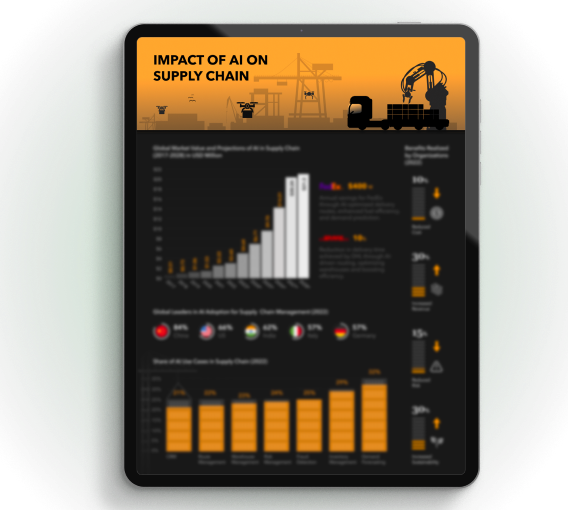
Use cases of AI in supply chain and logistics
Globalization and the internet have connected the world. For supply chain leaders, it has become necessary to be prompt with their services and reduce uncertainties while managing deliveries.
Many industries understand this and know that their modern customer base has higher expectations of speedy deliveries.
The most productive role for AI in the supply chain is prioritizing optimal actions and testing different scenarios to plan the best course of action. – Jonathan Wray, co-founder of Aible
Thanks to this notion of balancing the supply and demand gap, modern business leaders must maintain efficiency between suppliers, business partners, etc. This is where artificial intelligence steps in to streamline supply chains and logistics.
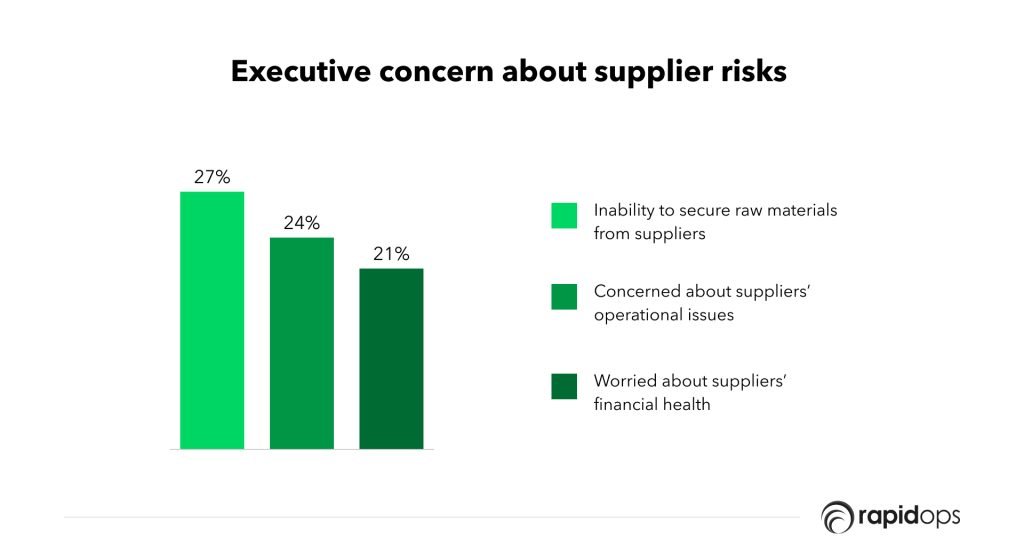
Much progress is yet to be made in implementing technology throughout the supply chain process. This PwC survey highlights the supply chain areas that are currently utilizing technologies.
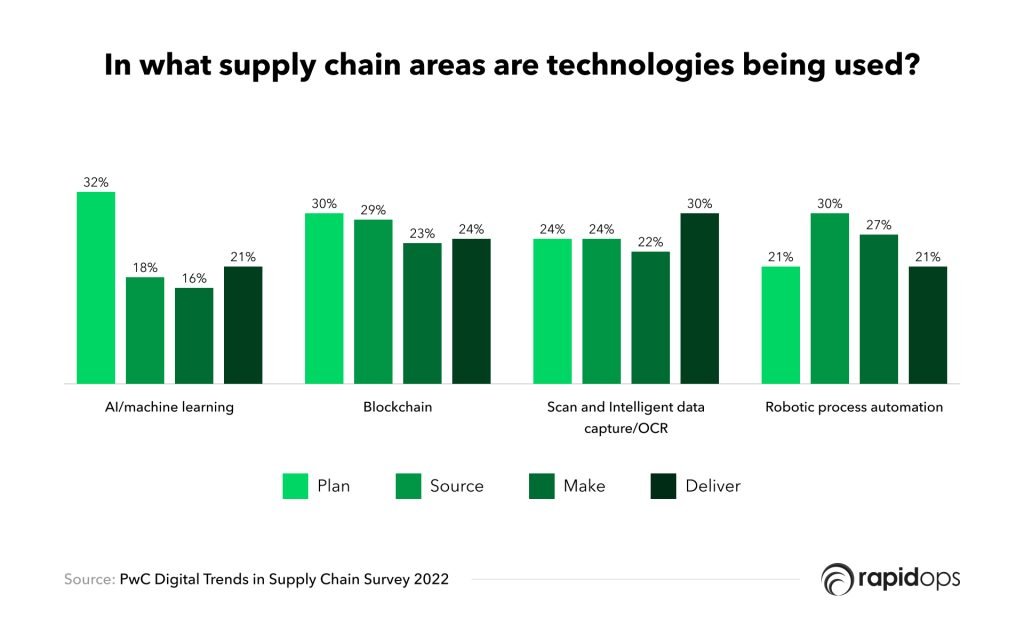
Companies deploy various technologies throughout their supply chain process depending on their needs. And yes, companies are implementing emerging technologies in various parts of their respective supply chains.
In their survey, PwC deduced that no single technology was cited by more than one-third of respondents in any area.
The plan function is seeing the overall tech adoption, with 77% of respondents identifying at least one tech that automates and enhances their supply chains. The same survey also focused on the respondents' tech investments as part of their digitalization initiative.
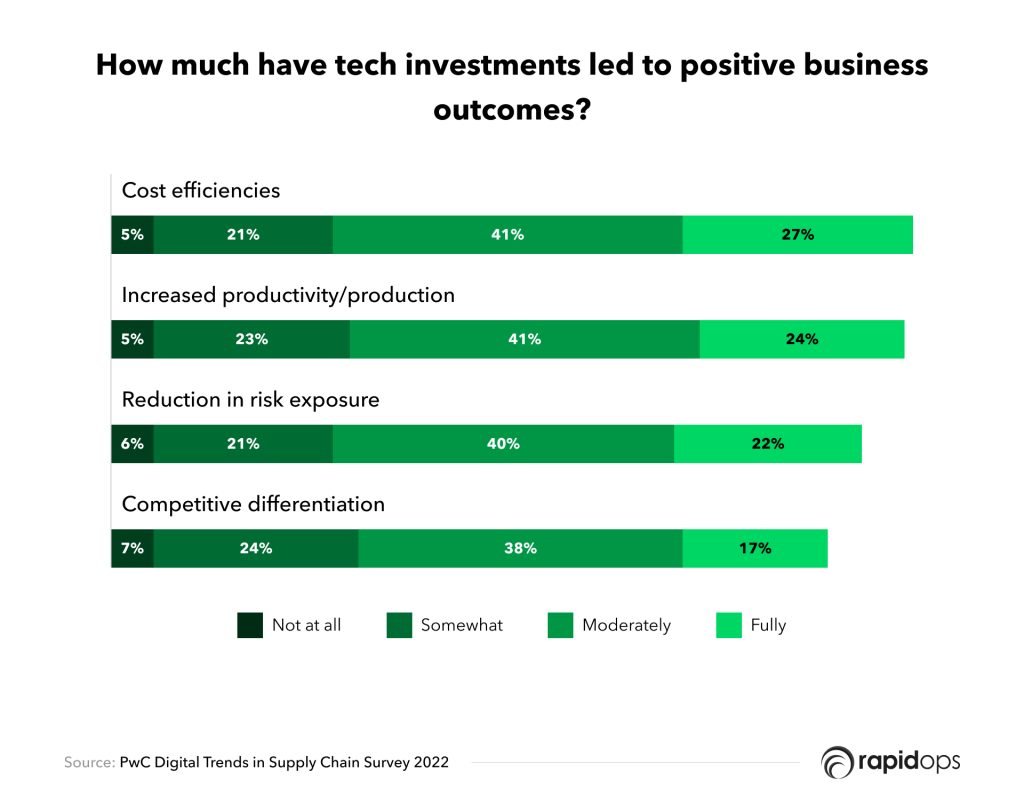
While supply chain leaders know that investment in relevant technology is worthwhile, those investments haven’t been 100% successful for the business.
Yet, cost efficiencies have seen the most significant impact, with two-thirds of respondents reporting positive business outcomes. The survey conducted by PwC highlights an important fact; business leaders are less impressed with how tech investments set them apart from competitors.
Let’s understand how AI impacts specific supply chain and logistics business segments.
1. Artificial intelligence in warehouse supply and demand management
Integrating artificial intelligence into warehouse operations can help managers understand and analyze customer buying trends.
By analyzing this data, they can order the necessary inventory and keep a check on the stock levels.
AI can also track the real-time location of items within the warehouse. This helps in reducing search time and making the overall process more efficient.
2. Artificial intelligence in transportation and logistics
When it comes to transportation and logistics, AI can
- plan delivery routes
- track vehicles
- predict traffic patterns
This helps in reducing fuel costs and making the overall process more efficient.
Moreover, by analyzing data related to past deliveries, AI can help identify potential delays and disruptions. Such insights allow leaders to make necessary changes in the delivery schedule.
3. Artificial intelligence in supply chain loading process
Artificial intelligence applications can also help optimize the supply chain loading process.
By analyzing data related to previous shipments, AI can identify patterns and trends that can help make the process more efficient. Moreover, AI can monitor shipments' status in real-time and identify potential delays. This information can then be used to make necessary changes in the loading and shipping schedule.
Benefits of implementing AI in supply chain and logistics
Here are some benefits you can gain by implementing AI in supply chain and logistics.
1. Operational cost reduction
Applying AI in supply chain and logistics reduces operational costs. By using predictive analytics for forecasting inventory more accurately, retailers will avoid costly stock-outs and inventory surpluses.
With the use of intelligent robots, they can be used to automate tasks such as picking and packing orders, which can lead to increased efficiency and reduced labor costs.
2. Improvement of forecasting accuracy
Applying AI in supply chain and logistics will improve forecasting accuracy. Accurate forecasts help owners make better decisions about inventory, production schedules, and staffing needs.
AI-powered predictive analytics can generate more precise forecasts with a wide range of data points like
- weather patterns
- historical sales data
- social media trends
3. Shipping and deliveries improvement
The application of AI in supply chain and logistics also improves shipping times and deliveries.
AI-powered systems can plan optimized shipping routes and enable real-time shipment tracking. With the help of advanced data analytics, AI also identifies potential delays and provides re-route shipments accordingly.
4. Become more customer-centric
AI/ML models feed on data. So, the cleaner the data, the better these models will be mapping customer preferences and behaviours. AI-powered product and service designing are also gaining a lot of momentum for the same reason.
These models can enhance the entire customer experience of the products and services businesses offer to individual customers. Such personalization helps customers stay loyal to your brand and recommend your company to others.
Real-life examples of AI in supply chain
Let’s see examples of how various businesses have applied artificial intelligence in supply chain.
1. AI is used to transport Rolls-Royce's products safely
Rolls-Royce has teamed up with Google to develop autonomous ships. Rather than simply replacing one driver in a self-driving car, this technology replaces 20-plus ship crew members.
Existing ships employ artificial intelligence technology to identify what is around them in the water and categorize things according to their risk of harming the ship.
The technology will expand in the future, incorporating sensors that track ship engine performance, cargo loading and unloading, and security monitoring. Ships will not get lost due to weather or collide with hazardous objects, allowing goods to get transported across oceans more quickly.
2. UPS is using artificial intelligence to build the most efficient routes for its trucks
Every minute and mile counts in supply chain deliveries. ORION (On-road Integrated Optimization and Navigation), an AI-powered GPS tool UPS uses, generates the most efficient routes for its vehicles. After customers, drivers and vehicles submit data to the machine, it then uses algorithms to generate routes most conducive to success.
ORION can potentially reduce UPS's delivery miles by 100 million annually, saving time and money and reducing emissions and wear and tear on its trucks. By shortening its drivers' daily routes, UPS anticipates saving $50 million annually.
Concluding thoughts: Improve operational efficiency with a resilient supply chain
As artificial intelligence technologies continue developing, they are expected to impact the supply chain industry significantly.
AI-enabled supply-chain management has enabled adopters to improve logistics costs by 15%, inventory levels by 35%, and service levels by 65%. – McKinsey
While supply chain leaders generally agree that tech investments are essential to smoothen or tighten supply chains, they are yet to realize their full potential.
Yes, AI technology can provide teams with more profound insights at a much higher frequency. However, this visibility alone will not be enough to capture more value from AI-based supply-chain solutions. Leaders must also focus on organizational changes, business process updates, and upskilling efforts to match any sizable technology investment. Only then will they see the expected ROI.
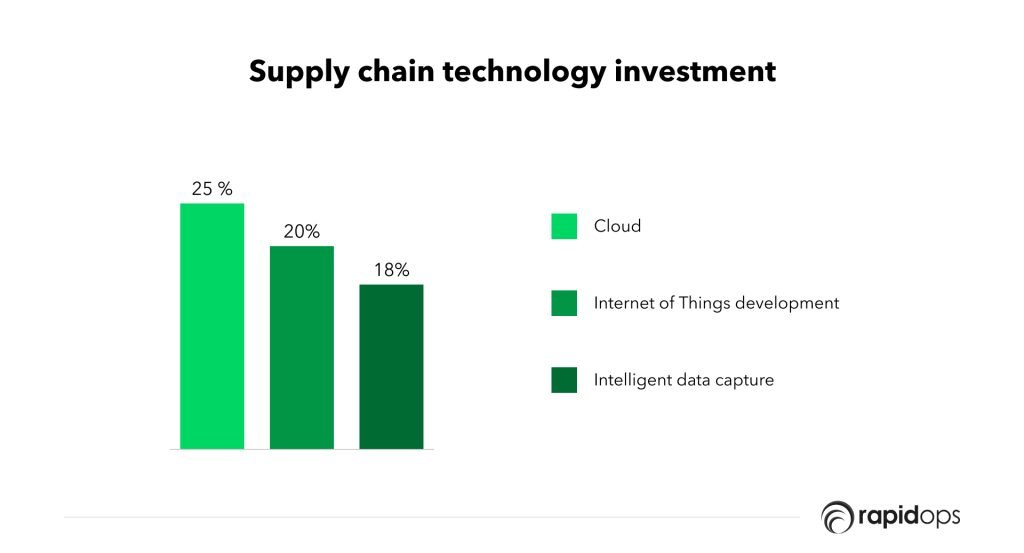
Leaders will see a paradigm shift from simple reactive intelligence to predictive, adaptive, and continuous learning systems. They will use these systems to drive better decisions for continuous supply chain process improvements using ML, AI, and data models.
Whether you are looking to implement artificial intelligence in the supply chain and logistics in its entirety or in a segmented manner, work with a digital partner.
Suppose you develop or plan to develop advanced supply chain capabilities. In that case, you are taking a robust economic step towards agility and creating a disruption-proof process – Jayesh Mori, CEO, Rapidops Inc.
Do you need help managing data sets, cleansing them, deciding their accuracy, and analyzing the skills required to make your AI-driven supply chain efficient? Then, get in touch with Rapidops. With our end-to-end solution, technical skills, expertise, and experience, we can help you build the AI system you require to enhance your supply chain.

Saptarshi Das
Content Editor
9+ years of expertise in content marketing, SEO, and SERP research. Creates informative, engaging content to achieve marketing goals. Empathetic approach and deep understanding of target audience needs. Expert in SEO optimization for maximum visibility. Your ideal content marketing strategist.
What’s Inside

Let’s build the next big thing!
Share your ideas and vision with us to explore your digital opportunities
Similar Stories
- AI
- 4 Mins
- September 2022

- AI
- 7 Mins
- April 2023


Receive articles like this in your mailbox
Sign up to get weekly insights & inspiration in your inbox.

